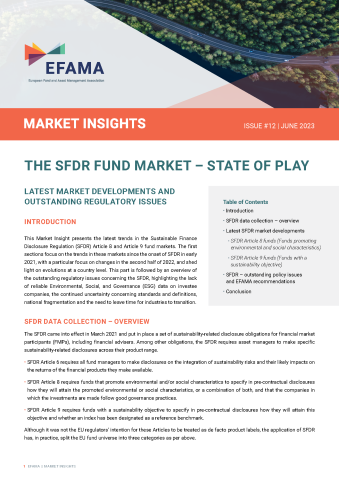EFAMA has released today a new issue of its Market Insights series titled “The SFDR fund market – State of play, latest market developments and outstanding regulatory issues ”.
This Market Insights presents the latest trends in the Sustainable Finance Disclosure Regulation (SFDR) Article 8 and Article 9 fund markets. It looks at developments since the onset of SFDR in early 2021, with a particular focus on changes in the second half of 2022, and sheds light on evolutions at a country level. It also provides an overview of outstanding regulatory issues and EFAMA recommendations concerning the SFDR.
SFDR market developments
-
Net assets of SFDR Article 8 funds rose to 45% of the total UCITS and AIF market at end 2022 (EUR 6.4 trillion) – Net assets grew by 17% during the second half of 2022, which was mainly a result of reclassifications, in contrast to the decline in total UCITS and AIF net assets of -1.7% over the same period.
-
The main domiciles of SFDR Article 8 funds at end 2022 were Luxembourg (34%), Ireland (16%), France (14%), the Netherlands (10%), and Sweden (7%) – The market share of Article 8 funds grew in sixteen countries between Q2 2022 and Q4 2022, whereas it decreased in four.
-
Article 9 fund net assets amounted to 2.4% of the European fund market at end 2022 (EUR 341 billion) – Net assets were 19% lower than at the end of Q2 2022 as a result of significant reclassifications of Article 9 to Article 8 funds in the second half of 2022. These occurred due to the fund industry’s conservative interpretation of ESMA guidance issued in June 2022, stating that portfolios of Article 9 funds should exclusively consist of sustainable investments.
-
The three core domiciles of SFDR Article 9 funds at end 2022 were Luxembourg (51%), France (18%), and Ireland (7%) – The Article 9 reclassifications in the second half of 2022 were mainly concentrated in those three large Article 9 domiciles, in smaller domiciles the evolution was more diverse.
Outstanding policy issues and EFAMA recommendations
-
A lack of reliable standardised data on investee companies remains the most significant issue concerning SFDR disclosures – While the recently adopted Corporate Sustainability Reporting Directive (CSRD) will play a pivotal role, the framework is still a work in progress and will only be fully phased-in from 2029 onwards.
-
Further guidance and clarification of concepts would be appreciated but should be embedded into existing frameworks and consistent across the investment value chain – We encourage policymakers to take the existing regulatory framework into account and to identify any possible gaps and remaining interpretation issues before introducing new legislative requirements.
-
Consistent and effective implementation of rules across Europe is key – Divergences across EU countries have not only created concerns for product manufacturers and distributors of cross-border ESG funds but have also created confusion for end investors, who may not be able to access comparable information on ESG investments.
-
Leave time and room for industries to transition – In order to enable the reallocation of capital towards sustainable finance, the regulatory framework should support the transition of industries, and not focus solely on those who have already reached the finish line.
Anyve Arakelijan, Regulatory Policy Advisor at EFAMA commented: “Despite challenges and uncertainties faced by the fund industry, there are promising signs of progress in the implementation process of the SFDR framework. Revisions to the SFDR RTS are underway, aiming to rectify deficiencies, while future plans include a more fundamental review of the SFDR. In parallel, the recently adopted phased-in CSRD framework should improve the accessibility and credibility of ESG data over time.”
Thomas Tilley, Senior Economist at EFAMA commented: “As fund managers will continue to adapt to new policy guidance, clearer definitions, and better ESG data, the Article 8 and Article 9 funds markets will most likely remain in full flux over the next few years.”
EFAMA’s Director General, Tanguy van de Werve, commented: “This latest issue of our Market Insights series zooms in on the SFDR, a key pillar of sustainable investing. EU regulation significantly impacts the development of sustainable finance and it will be important for the next phase of regulatory changes to provide clarity and stability to support Europe’s transition to net-zero.”
- ENDS -
Notes to Editors
For further information, please contact:
Hayley McEwen
Head of communications and member development
Hayley.McEwen@efama.org
About the Market Insights
EFAMA’s Market Insights series analyses recent industry trends and developments based on the latest available data and presents our findings in the context of current policy perspectives. We publish numerous concise reports each year covering diverse topics such as the impact of inflation on retail investors, sustainable bond funds, UCITS costs and performance, ESG fund markets, and money market funds.


























